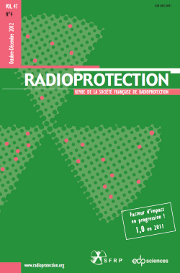Article contents
Impact of industries in the accumulation of radionuclides inthe lower part of Ebro river (Catalonia, Spain)
Published online by Cambridge University Press: 17 December 2010
Abstract
Ebro River extends over almost 930 km and is the main Spanish river entering theMediterranean Sea. There are several industries located along this river course includinga dicalcium phosphate factory (DCP) and two nuclear power reactors. These installations,together with other factors such as the geology, can contribute to the radiologicalcontent of the river. Therefore, this study was performed to determine some natural andalso some anthropogenic radionuclide concentrations in the Ebro River ecosystem. Weanalysed water samples, solid samples (rice field sludge and surface marine sedimentsamples), and also biota samples (Cladophora glomerata andCynodon dactylon). For water samples, gross alpha, gross beta, tritium,uranium, thorium and also a group of gamma-emitting isotopes’ activities were determined.The main contribution to radioactivity for these samples was due to some isotopes from theuranium and thorium chain. For the solid samples, we quantified some natural andartificial gamma radioisotopes, which may be related to the geological and/or industrialactivities located in this zone. In the case of biota, the results indicate that thepresence of the DCP has a significant influence, since the highest activity was observedin the surroundings of this industry (Flix), where isotopes such as 214Bi and214Pb presented activity values of 105 ± 43 Bq/kg and 100 ± 58 Bq/kg,respectively.
- Type
- Article
- Information
- Copyright
- © EDP Sciences, 2010
References
- 9
- Cited by


